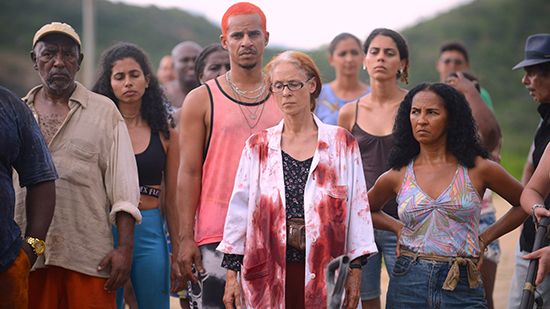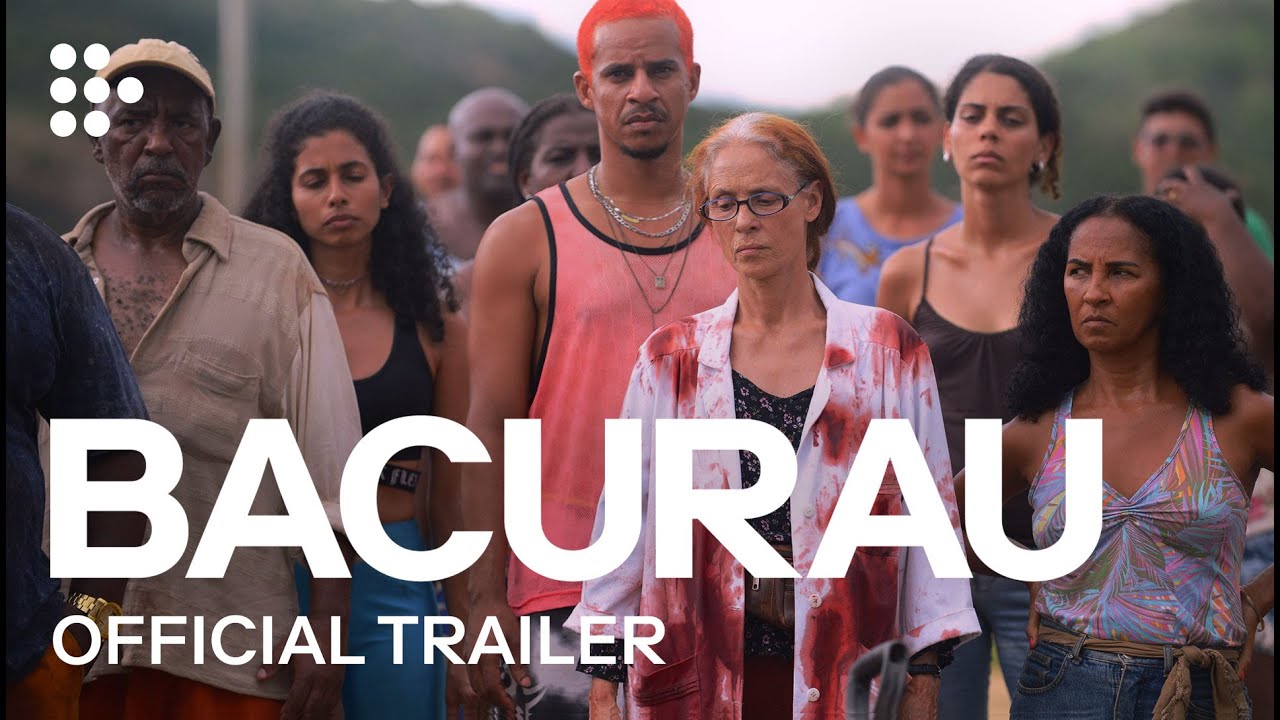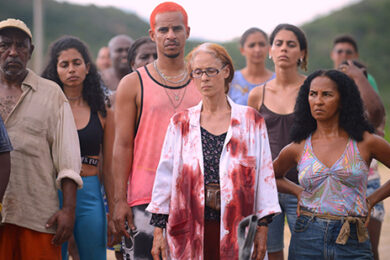A truck runs over cheap-looking coffins on a dirt road, sending splintered wood flying. Signage for the town of ‘Bacurau’ flashes on the screen, under which are the words: “If you come, come in peace”. The opening scenes of Bacurau set a macabre tone for this bloody and profound sci-fi-thriller-western from Brazilian filmmakers Kleber Mendonça Filho and Juliano Dornelles. The movie won the Jury Prize at Cannes in May 2019, and was successfully controversial upon its release in Brazil.
The rural locale might be unfamiliar to most viewers: this is not the vast metropolis of São Paulo, the sexy beaches and green hills of Rio, or the lush, dense Amazon, but the Sertão – a vast backlands known for its brutal, dry climate. Whilst the dustbowl location makes for a perfect re-telling of the Western – transposed some 4000 miles south of Texas – this region also has historical resonance. The Sertão was the setting for the most bloody war of resistance in Brazil’s history. From 1896-97, members of a religious community known as ‘Canudos’ held off the Brazilian army’s canons and modern guns with muskets and wooden sticks; after 11 months, 30,000 were dead and the town was burned to the ground.
A news notice on a TV screen tells us that public executions are now law; other small details reveal that we are in a dystopian near-future. Bacurau offers a comment on today’s Brazil, a country with some of the highest murder rates in the world, where in Rio de Janeiro police fly helicopters over favela communities and fire indiscriminately into the roofs below, where the last election saw the populace reject a university professor for an ex-army captain who praises dictatorship and torture. Brazil: an absurd country, and the perfect place to set this film.
We meet a young doctor, Teresa (played by Bárbara Colen), the daughter of a recently deceased women and pillar of the community, whose burial she has returned for. A funeral procession led by Bacurau’s troubadour demonstrates the town’s uniqueness and sense of solidarity. Significantly, the inhabitants are mostly people of colour, like in the persecuted favelas or perhaps the escaped-slave communities (known as Quilombos) in pre-emancipation Brazil. Teresa watches in distress as water bubbles out from her mother’s coffin. Is this something real, supernatural or drug-induced? The theme of water is present throughout the film, we learn that a dam has blocked a vital river and later a water-truck arrives in the town (a familiar site in the dry backlands of the Sertão) – but in Bacurau, it is full of bullet holes.
The community is shown to be a quasi-utopia: residents have a strong sense of the collective; progressive gender roles exist; there is a relaxed attitude to drugs, nudity and sex work and, interestingly, people are not religious – we learn that the church is being used for storage. The directors seem to mock Brazil’s evangelical Church, who played a crucial role in far-right candidate Jair Bolsonaro’s presidential victory.
The film balances humour and horror to great effect. The arrival of the incompetent and corrupt mayor is hugely funny: after a tip-off about his impending visit, residents quickly pack up their things and the whole town rushes indoors in a flurry of dust. The politician arrives to deserted streets and, through a megaphone, pleads for the people to talk with him.
In response, unseen voices shout abuse from their homes: “Open the dam, you bastard!”. The mayor has brought ‘presents’, supplies of food (expired, we later learn) and a mountain of books dumped from a truck onto the dirt floor. The scene quickly turns sinister, as a young girl is dragged from her home and taken off in the mayor’s car.
That night in the moonlight, wild horses run through the streets, but despite the beauty of the moment there is warning in their arrival – they have escaped from a nearby farm. The next day, strangers arrive on motorbikes (in Brazil, this often spells danger). They are Paulistas from São Paulo just “enjoying the countryside,” they say. This event expertly captures the dynamic of rich and arrogant Southern tourists, who travel to the northeast and treat the region and its people as curiosities. The townspeople suggest that the Paulistas visit the Bacurau museum, but the tourists refuse – this will prove costly. One of the bikers places a technological device under a shop table, and they leave.
Two Bacurau men, sent to investigate the escaped horses, arrive at the farm to find a massacre. The images are of genuine horror: a woman and child’s bloody bodies lie strewn across the seats of a bullet-ridden car, inside the farmhouse men’s corpses are covered in blood and flies. The killings chime with real-life Brazil, where land disputes between landowners and small farmers often end in violence, only ever with the same victor. Later we see cartoonish brutality (typical of Tarantino), that produces a very different sensation demonstrating the directors’ understanding of the complexity of onscreen violence.
The Paulistas run into the two Bacurau men and kill them, they then return to a ranch where we meet a wild band of twisted Gringos – subverting stereotypical Hollywood depictions of Latin people – who laugh at the Brazilians for thinking they are European. At the dinner table, the Gringos gun down the Paulistas and then argue about who got the kill, thus revealing the film’s plot: Western tourists are in rural Brazil to murder the populace for sport. From here, the film’s pace accelerates. We see a series of violent interactions between the townspeople and their predators, ending in a final bloody showdown. We also learn of the contents of the town museum, wherein lies the film’s key message.
The movie works as a thrilling tale of a town’s unified resistance against a corrupt local government and crazed foreigners. Tension is expertly created; the soundtrack relies heavily on the MiniMoog and sounds like something from a John Carpenter film – in a nod to the The Thing director, the school in Bacurau is named João Carpinteiro.
A lot is crammed into 131 minutes, we meet well over 20 characters all of whom are intriguing and deserve more screen time – the film would have made a great mini-series. The bloodthirsty, androgynous Canganço (Cowboy) Lunga, played by Silvero Pereira, is a reincarnation of Lampião, a well-known early 20th century bandit from the northeast, who, despite his brutality, is still a celebrated figure of resistance. At the end of the film, Lunga cuts off the Gringos’ heads and displays them outside the church, honouring Lampião who had his own publicly exhibited in a Salvador square.
All of Mendonça Filho’s features have concerned land and resistance, a crucial topic in Brazil, and both are set in his native Recife. Neighbouring Sounds and Aquarius both hint at violence but never display it, in Bacurau the filmmakers use it liberally to provoke discussion about the normalisation of violence in Brazilian life, commonly on the receiving end are the poor and people of colour, like the residents of Bacurau.
“Why are you doing this?” is the crucial question of the film, which several townspeople ask their tourist-hunters – it is something indigenous people may have contemplated when men arrived on the shores of their continent to slash, burn, enslave and pillage. At the end of the film, we learn that the town museum is a monument to a history of resistance; like the Vietnam or Afghanistan wars, the invader’s ignorance will be his downfall.
In an era when Brazil’s president excitedly panders to Donald Trump’s USA, Bacurau satirically pushes the idea of Latin American exploitation by foreigners (with the complicity of the elite) to its most extreme. But the film leaves us with a sense of hope, like Mendonça-Filho’s other features, we are reminded that whatever happens, ‘O povo resiste’. The people resist.




